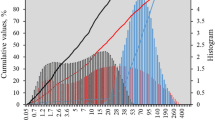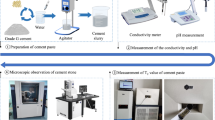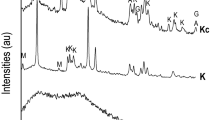Abstract
THE effect of chloride-containing solutions on Portland cement has received relatively little attention. Batta1 and Thorvaldson2 noted that addition of chloride ions to solutions containing sulphate reduced or inhibited the expansion of concrete and mortar bars. Batta attributed this effect to the increased solubility of gypsum and calcium sulphoaluminate in chloride solutions.
This is a preview of subscription content, access via your institution
Access options
Subscribe to this journal
Receive 51 print issues and online access
$199.00 per year
only $3.90 per issue
Buy this article
- Purchase on Springer Link
- Instant access to full article PDF
Prices may be subject to local taxes which are calculated during checkout
Similar content being viewed by others
References
Batta, G., Ann. Trav. Pub. Belg. (August 1948).
Thorvaldson, T., Proc. Third Intern. Symp. Chem. Cement (London, 1952).
Author information
Authors and Affiliations
Rights and permissions
About this article
Cite this article
HELLER, L., BEN-YAIR, M. Formation of Calcium Chloraluminate by Interaction of Portland Cement with Sea-water and Chloride Solutions. Nature 191, 488–489 (1961). https://doi.org/10.1038/191488b0
Published:
Issue Date:
DOI: https://doi.org/10.1038/191488b0
Comments
By submitting a comment you agree to abide by our Terms and Community Guidelines. If you find something abusive or that does not comply with our terms or guidelines please flag it as inappropriate.



